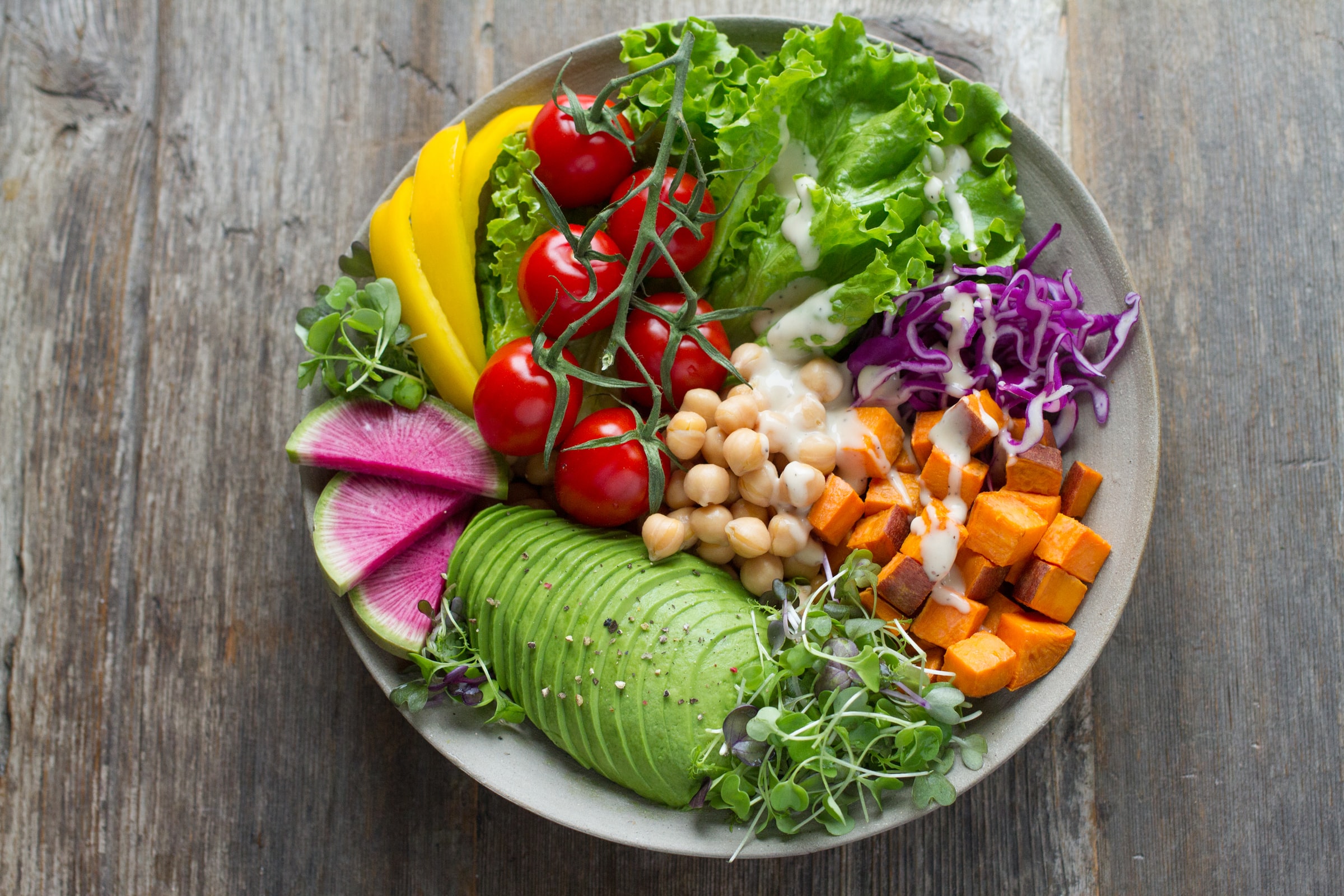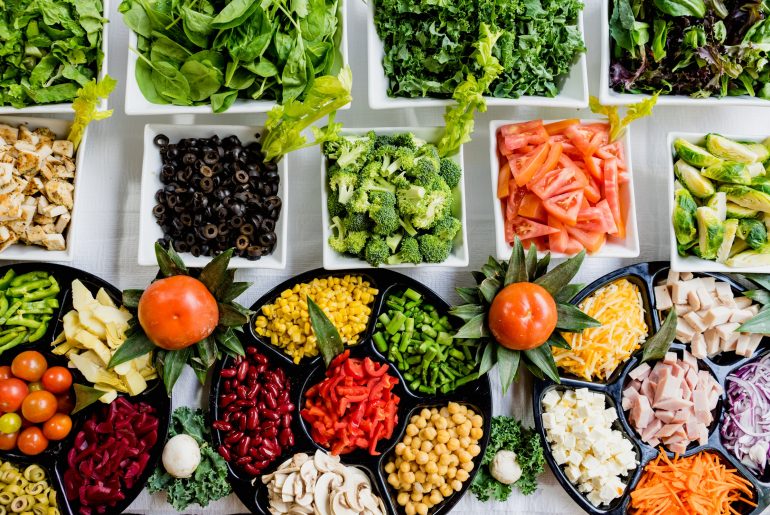This article may contain references to products or services from one or more of our advertisers or partners. We may receive compensation when you click on links to those products or services. Nonetheless, our opinions are our own.

Updated by Albert Fang
Despite the stereotype of surviving on pizza, pre-packaged foods, and caffeine, it actually can be easy for college students to eat healthy even while on a budget. It just takes some planning and swapping out certain healthy foods for their inexpensive counterparts.
We’ll discuss healthy and affordable eating tips for college students, as well as why eating healthy is important and how this affects major items in your life, including insurance rates and coverage.
- The Importance of Healthy Eating
- How to Eat Healthy on a Budget
- #1 – Try Frozen Fruits and Veggies
- #2 – Cut Back on Processed and Junk Foods
- #3 – Plan Your Meals
- #4 – Make a List
- #5 – Cook at Home
- #6 – Enjoy Leftovers
- #7 – Focus on Water
- #8 – Try a Meatless Monday
- #9 – Eat Seasonally
- Eat Healthy and Stay on Budget
- Recommended Reads
The Importance of Healthy Eating
Eating a varied and healthy diet is important for energy, immunity, and providing your body with the fuel needed to study, learn, and be active. Eating a healthy diet is also important for managing weight. Being overweight can increase your risk of many chronic health conditions and affect life insurance rates and coverage.
While managing your weight is important, you can still get life insurance even if you are overweight. It may just be more costly. You can use a life insurance weight chart to help you decide on the best option.
You should also get quotes online or consult an insurance agent to find affordable coverage.
Another essential aspect to consider is how nutrition can influence not just physical wellbeing but also cognitive performance. Research suggests that maintaining a balanced diet rich in whole foods can benefit your Mental Health and Brain Function, supporting focus and emotional balance. For more comprehensive guidance on which dietary choices promote optimal brain health—and which ones to avoid—consider exploring this detailed guide on enhancing mental clarity through smart eating habits.
How to Eat Healthy on a Budget
A few simple swaps or changes to your lifestyle can help you eat healthier. Here are some tips to help you find cheap healthy foods for college students or anyone trying to live on a budget. For more useful money-saving tips for students, there’s a great guide on koopy.com.
#1 – Try Frozen Fruits and Veggies
Fruits and vegetables should be some of the cornerstones of our diet. Fresh fruits and vegetables are great, but they can be costly and can go bad quickly. One option that can save money on produce is choosing frozen fruits and veggies.
- They are frozen at peak quality so they retain a lot of the vitamins and minerals after harvest.
- These frozen options are also usually on sale, don’t go bad as fast, and enable you to portion out the amount you need easily.
#2 – Cut Back on Processed and Junk Foods
For an easy and nutritious option, consider incorporating the versatile spread, tahini, into your meals for its rich flavor and numerous health benefits, like a good source of healthy fats.
Processed foods like chips, candy, desserts, packaged or boxed meals, and frozen pizzas may be cheap, but they don’t help you meet your nutritional needs. You might eat these foods and find yourself hungry sooner. Choose more nutritious and filling options like lean protein, low-fat dairy, fruits, vegetables, whole grains, and nuts or seeds.
#3 – Plan Your Meals
Planning out your meals and snacks ahead of time is a great way to save money. You can use the store advertisements to plan your meals for a few days or the week. You can find new healthy recipes or healthy snack options online, too. Or, if you live on campus, a great way of saving money is through joining a campus meal plan.
#4 – Make a List
Make a list of the items you need for your meal planning and restocking your refrigerator or pantry. A list will help you save time at the store so you can focus on what you need to get and make fewer trips to the store. Sticking to your list can also help you stay on budget.
#5 – Cook at Home
Cooking meals at home is always cheaper than eating out at restaurants or ordering from delivery services. It may take a little extra time to go to the supermarket and prepare the meals, but it will save you money and be healthier in the long run.
#6 – Enjoy Leftovers
Cooking once and eating leftovers is not only a way to save money, but it can also save time. If you do go to a restaurant, you can also use those leftovers for a future meal.
#7 – Focus on Water
Sugary beverages like soda, energy drinks, sports drinks, and sugary coffee beverages are expensive and full of added sugar. One easy way to save money is to make water your beverage of choice.
Cutting back on soda and sugary drinks will also lower your risk of diabetes, which can negatively affect your weight, health, finances, and life insurance rates.
#8 – Try a Meatless Monday
Meat is a big part of our food budget. If you can cut back on meat at meals or try a vegetarian meal once or twice a week, it will help your budget. Canned beans, eggs, peanut butter, canned tuna, tofu, or tempeh can be inexpensive protein options to help save you money.

#9 – Eat Seasonally
Seasonal fruits and vegetables are usually cheaper and higher quality than produce that isn’t in season. Some fruits and vegetables like bananas, cucumbers, broccoli, and oranges are usually inexpensive most of the time. Try the frozen options if your choices are not in season.
Eat Healthy and Stay on Budget
It doesn’t have to be impossible to eat healthy as a broke college student. It takes some planning and making some changes to your diet, but any college student can eat healthy and manage their finances at the same time.

Reviewed and edited by Albert Fang.
See a typo or want to suggest an edit/revision to the content? Use the contact us form to provide feedback.
At FangWallet, we value editorial integrity and open collaboration in curating quality content for readers to enjoy. Much appreciated for the assist.
Did you like our article and find it insightful? We encourage sharing the article link with family and friends to benefit as well - better yet, sharing on social media. Thank you for the support! 🍉
Article Title: 9 Tips for College Students to Eat Healthy on a Budget
https://fangwallet.com/2022/01/27/9-tips-for-college-students-to-eat-healthy-on-a-budget/The FangWallet Promise
FangWallet is an editorially independent resource - founded on breaking down challenging financial concepts for anyone to understand since 2014. While we adhere to editorial integrity, note that this post may contain references to products from our partners.
The FangWallet promise is always to have your best interest in mind and be transparent and honest about the financial picture.
Become an Insider

Subscribe to get a free daily budget planner printable to help get your money on track!
Make passive money the right way. No spam.
Editorial Disclaimer: The editorial content on this page is not provided by any of the companies mentioned. The opinions expressed here are the author's alone.
The content of this website is for informational purposes only and does not represent investment advice, or an offer or solicitation to buy or sell any security, investment, or product. Investors are encouraged to do their own due diligence, and, if necessary, consult professional advising before making any investment decisions. Investing involves a high degree of risk, and financial losses may occur including the potential loss of principal.
Source Citation References:
+ Inspo
There are no additional citations or references to note for this article at this time.












































